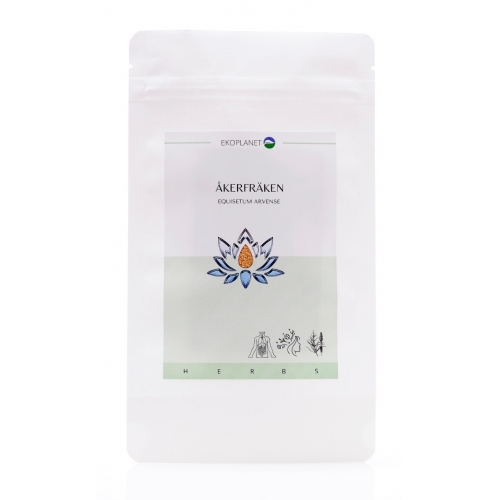Common soapwort - Saponaria officinalis radix-100g
Crow soap (Saponaria officinalis) is a perennial herb that can be used both internally and externally. The plant's water-soluble glycosides meant that it was once used as a detergent. Internally, the herb can be used as an infusion. Crow soap with one of the herbs that contain the most saponins - up to 5%.
Comparative price: SEK 650/kg
![]() Crow soap occurrence
Crow soap occurrence
Originally, common soapwort come from southern and central Europe and have been in the Nordics since the Viking Age. It has been called soapwort. The plant is a perennial herb and belongs to the plants that are often found wild on culturally affected land by old waste farms and along roadsides. Crow Soap is also found in gardens as an ornamental plant as it produces beautiful flowers. The herb forms large stands with the help of the branching rhizome with shoots and seeding. The height varies between 30 and 70 cm. The flowers are white, light or dark pink, single or filled, fragrant and sit tightly gathered in clusters at the top. The plant blooms from July to September or October.
The Latin name, Saponaria officinalis, describes well the areas of use of the soap clove. Saponarius means soapy, which lathers.
![]() Crow soap uses
Crow soap uses
Common soapwort is an old medicinal and household plant. In the past, it was used instead of crow soap when washing clothes or other delicate fabrics, because the plant's water-soluble and fat-dissolving glycosides found mainly in the root caused the decoction of the south-cut root to lather.
It is also possible to make Common soapwort Carnation Shampoo, which is very mild and suitable for sensitive scalps. Saponins found in the plant help other substances penetrate the skin. This applies especially to fungal problems (such as dandruff). The shampoo lathers less compared to regular shampoo.
Do this:
Use 3-5 grams of root per 100 ml of water. Simmer simmer covered for 15-20 min. Strain and use directly on the skin/hair. Finished solution lasts about 1 week in the fridge. For a better effect, you can mix in a few drops of lemon juice.
To preserve the decoction, add it to products such as hair conditioner, hair shampoo, lotions, etc., which are preserved.
Crow soap contains the most saponins - up to 5% (the content is highest before flowering). Saponins have a strong expectorant and cough-promoting effect and can be used for whooping cough. Saponins also have anti-inflammatory effects and can help increase the absorption of minerals from our intestines. The herb was also said to help with gout, jaundice and purify the blood.
To make a good tea mixture for coughing use:
20 g licorice root in pieces
20 g thyme 20 g anise seeds
40 g Crow soap
Use ½ tsp dried herbs per 2.5 parts water. Let simmer covered for 10 min. Strain! Can be sweetened with honey.
![]() Contraindications and possible side effects
Contraindications and possible side effects
Crow soap can be dangerous at too high doses or if used for a long time as red blood cells can be broken down by saponins, therefore it is recommended to use soap cloves for 4-5 weeks - then a break of 1-2 weeks.
Do not use in case of hypersensitivity to the herb. Pregnant and nursing mothers should consult a doctor before using the herb.
 Ingredients: Common soapwort dried root (Saponaria officinalis radix)
Ingredients: Common soapwort dried root (Saponaria officinalis radix)
![]() Dosage:
Dosage:
Infusion: Use ½ teaspoon of dried finely Common soapwort per 2.5 parts of water. Let simmer covered for 10 min. Strain and drink between meals 2-3 times a day. Can be used for 4-5 weeks - then a break of 1-2 weeks.
Common soapwort shampoo: Use 3-5 grams of root per 100 ml of water. Simmer simmer covered for 15-20 min. Strain and use directly on the skin/hair. Finished solution lasts about 1 week in the fridge. For a better effect, you can mix in a few drops of lemon juice.
To preserve the decoction, add it to products such as hair conditioner, hair shampoo, lotions, etc., which are preserved
![]() Storage: dry and cool
Storage: dry and cool
![]() ATTENTION!
ATTENTION!
Common soapwort can be dangerous at too high doses or if used for a long time as red blood cells can be broken down by saponins, therefore it is recommended to use soap cloves for 4-5 weeks - then a break of 1-2 weeks.
Do not use in case of hypersensitivity to the herb. Pregnant and nursing mothers should consult a doctor before using the herb.














